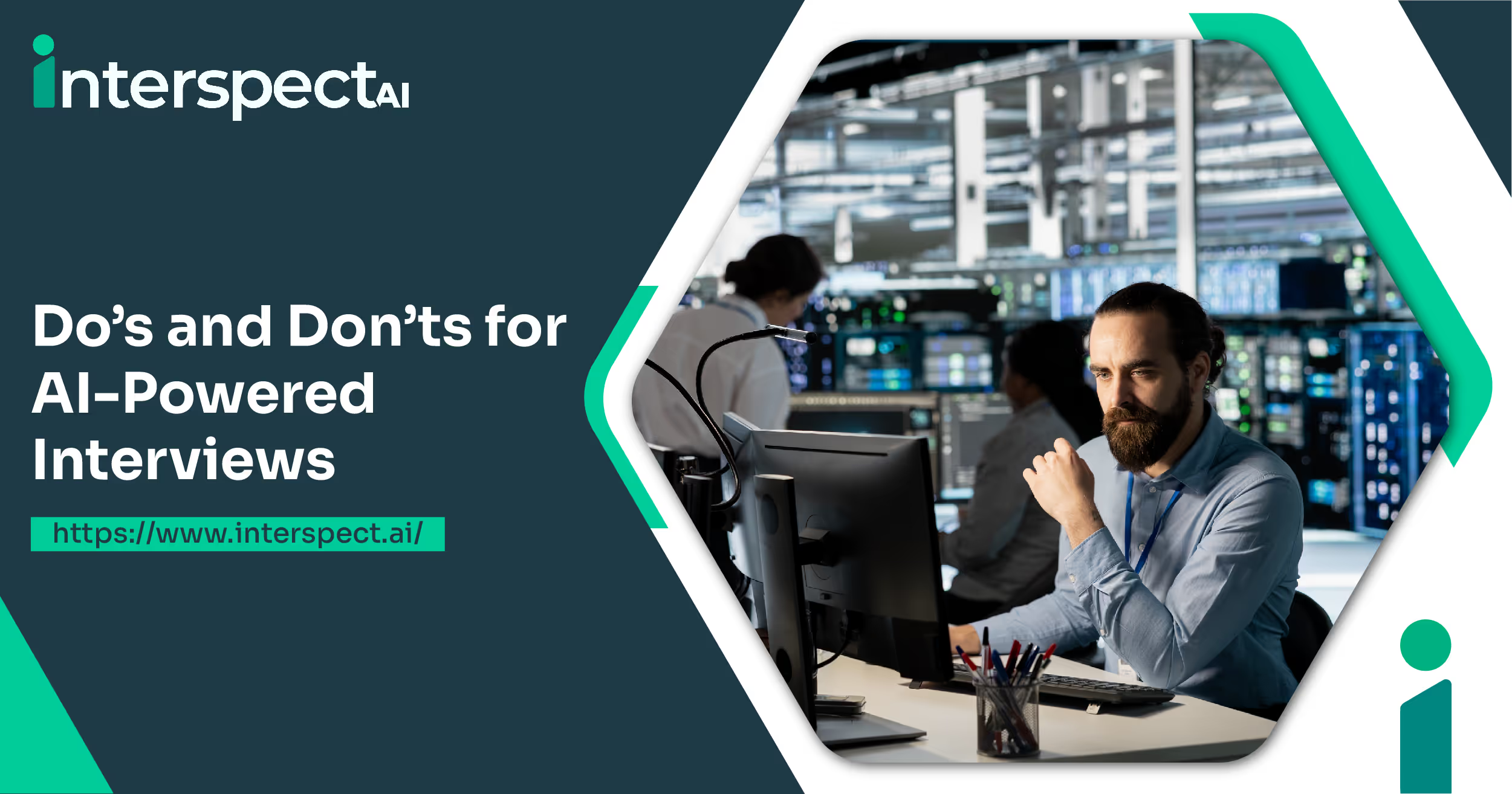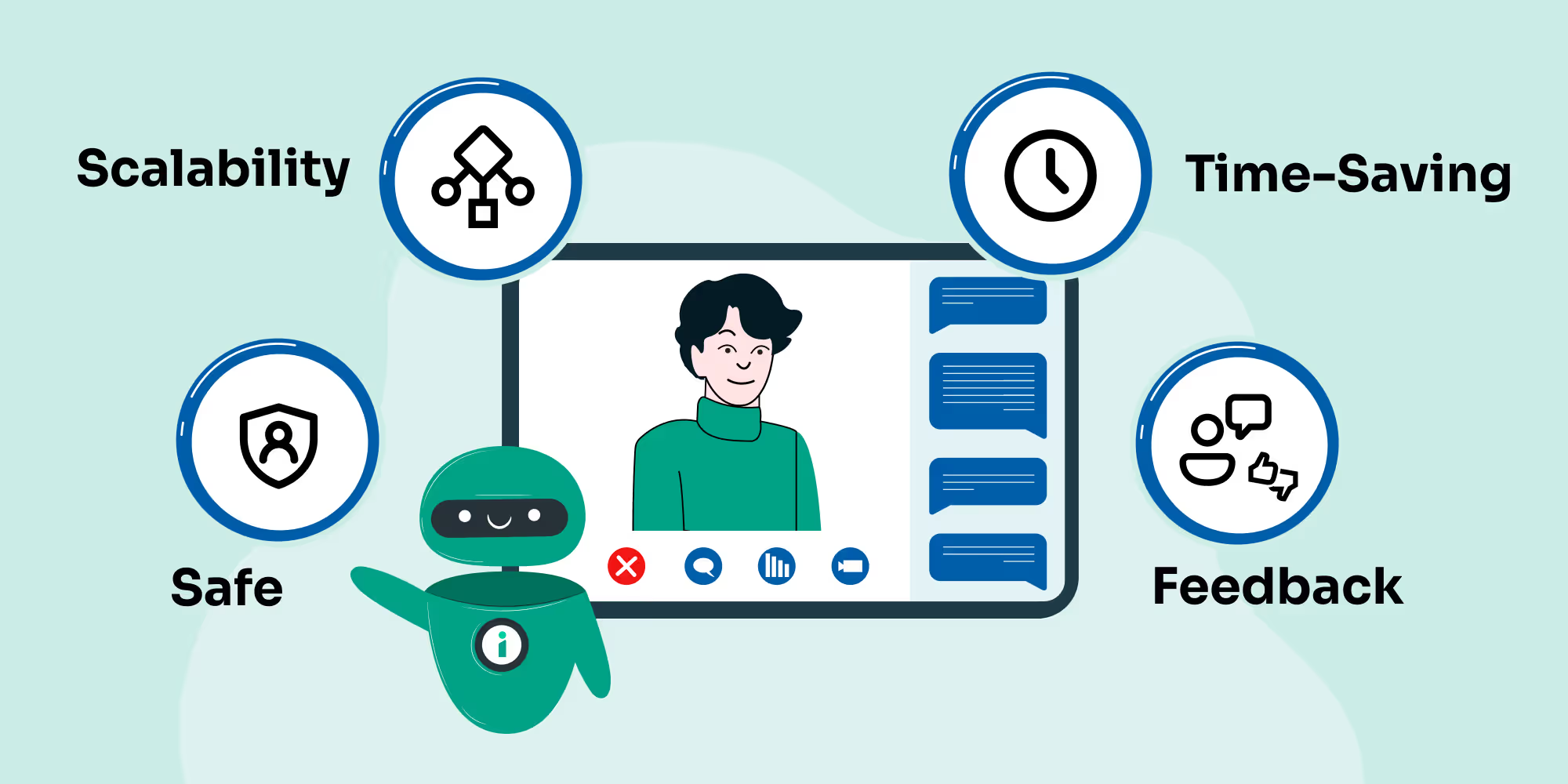
AI-powered interviews are no longer a futuristic concept—they're happening right now, from initial screening calls to comprehensive assessments. Whether you're a hiring manager implementing new systems or a candidate preparing for your next interview, understanding how to navigate this landscape can make the difference between success and frustration.
AI interviews enable organizations to evaluate more candidates in less time, reduce unconscious bias, and maintain consistent standards. However, effective implementation requires careful attention to both technology and human factors. The following do’s and don’ts will guide you toward responsible, high-impact AI interviewing.
The Do’s: Building Trust and Fairness
1. Transparency in AI Usage
Candidates deserve clear guidance on how the hiring process works. At a minimum, job postings should clearly indicate that AI-powered interviews will be used, and scheduling emails should include detailed instructions on the technology, assessment criteria, and the presence of human oversight. This clarity reduces candidate anxiety and cultivates trust.
2. Objective, Skills-Based Assessment
AI excels at analyzing structured tasks. Design interview questions around measurable competencies—technical problem solutions, situational judgment scenarios, and communication exercises—rather than subjective traits. Collaborate with hiring managers to define clear performance metrics and translate them into consistent AI prompts.
3. Human Oversight and Final Authority
While AI can surface insights, human recruiters must interpret results and make final decisions. A layered review process—where AI flags candidates for human review—balances efficiency with nuanced judgment about team dynamics, cultural fit, and growth potential.
4. Positive Candidate Experience
AI interviews can feel impersonal, so consider adding human touches, such as introductory videos, personable instructions, and practice sessions. Providing mock interview tools and responsive technical support helps candidates feel prepared and respected, enhancing overall engagement.
5. Regular Bias Audits and Monitoring
Even diverse datasets can harbor hidden biases. Schedule quarterly reviews of AI interview outcomes by demographic group. Utilize built-in monitoring dashboards and bias-detection algorithms to identify disparities, then recalibrate data and models as necessary.
The Don’ts: Pitfalls to Avoid
1. Opaque “Black Box” Deployments
Avoid AI solutions that withhold decision logic. Demand explainable AI platforms that reveal scoring factors—such as response clarity, problem-solving structure, and domain knowledge—so recruiters can interpret and trust results.
2. Overlooking Privacy and Security
AI interviews collect sensitive data, including video, audio, and transcripts. Protect this information with end-to-end encryption, strict access controls, and compliance with the GDPR, CCPA, HIPAA, and SOC 2 standards. Obtain explicit consent from candidates and enforce clear data retention policies.
3. Training Solely on Historical Data
Historical hiring data often reflects past biases and prejudices. Augment internal datasets with industry benchmarks and anonymized external sources to ensure diversity. Regularly update training data to capture evolving skills and demographics.
4. Skipping Training & Change Management
Introducing AI without proper training leads to resistance and errors. Offer comprehensive workshops for recruiters, pilot programs for feedback, and precise documentation on AI capabilities and limitations to ensure smooth adoption.
5. Neglecting Candidate Rights & Appeals
Candidates must have the right to request human review, challenge outcomes, and receive explanations. Establish a straightforward appeals process, and respond promptly to demonstrate your commitment to fairness and transparency.
SpectraHire: AI-Powered Hiring, Simplified
Implementing these do’s and don’ts becomes seamless with SpectraHire, InterspectAI’s conversational intelligence platform:
- Transparent Criteria: Provides clear scoring explanations, enabling recruiters to understand the assessment factors.
- Skills-First Interviews: Focuses on job-relevant challenges—technical tasks, situational simulations, and communication exercises.
- Human-Centered Workflow: AI insights inform recruiters, who retain decision-making authority.
- Bias Reduction: Employs non-profiling algorithms and real-time monitoring dashboards to ensure equitable outcomes.
- Security & Compliance: End-to-end encryption with SOC2, GDPR, CCPA, and HIPAA standards.
- Seamless Integration: Easily plugs into existing HR systems with minimal development effort.
For candidates seeking preparation, SpectraSeek offers AI-powered mock interviews with instant feedback on response structure, helping job seekers refine their performance and boost confidence.
Conclusion & Call to Action
AI interviews offer unprecedented efficiency, consistency, and scalability—but these benefits materialize only when paired with ethical, human-centered design. By embracing transparency, focusing on skills, safeguarding privacy, maintaining human oversight, and continuously auditing for bias, you can unlock the full potential of AI in hiring.
Ready to transform your recruitment process?
Request a demo of SpectraHire today and experience how AI can power fairer, faster, and more effective hiring—while keeping people at the center of every decision.
FAQs
1. What information should be disclosed to candidates about AI interviews?
Clearly state in job postings and interview invites which stages use AI, what skills are assessed, and how human reviewers will use the AI insights.
2. How can I prepare candidates for AI-powered interviews?
Provide detailed instructions, offer practice sessions or mock interviews (e.g., via SpectraSeek), and ensure technical support is available throughout the process.
3. How do I ensure AI interviews remain fair and unbiased?
Conduct regular bias audits—review outcomes by demographic group quarterly, use diverse training data, and recalibrate algorithms if disparities are detected.
4. What alternatives can I offer if candidates face technical challenges?
Offer equally weighted options such as phone interviews, in-person meetings, or written assessments to accommodate varying access and preferences.
Subscribe to The InterspectAI Blog


%201.svg)








